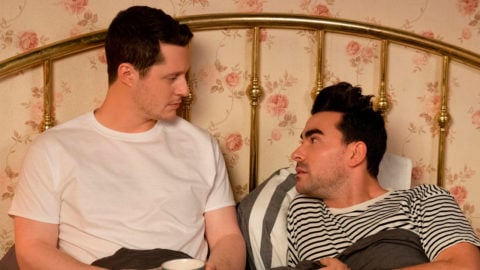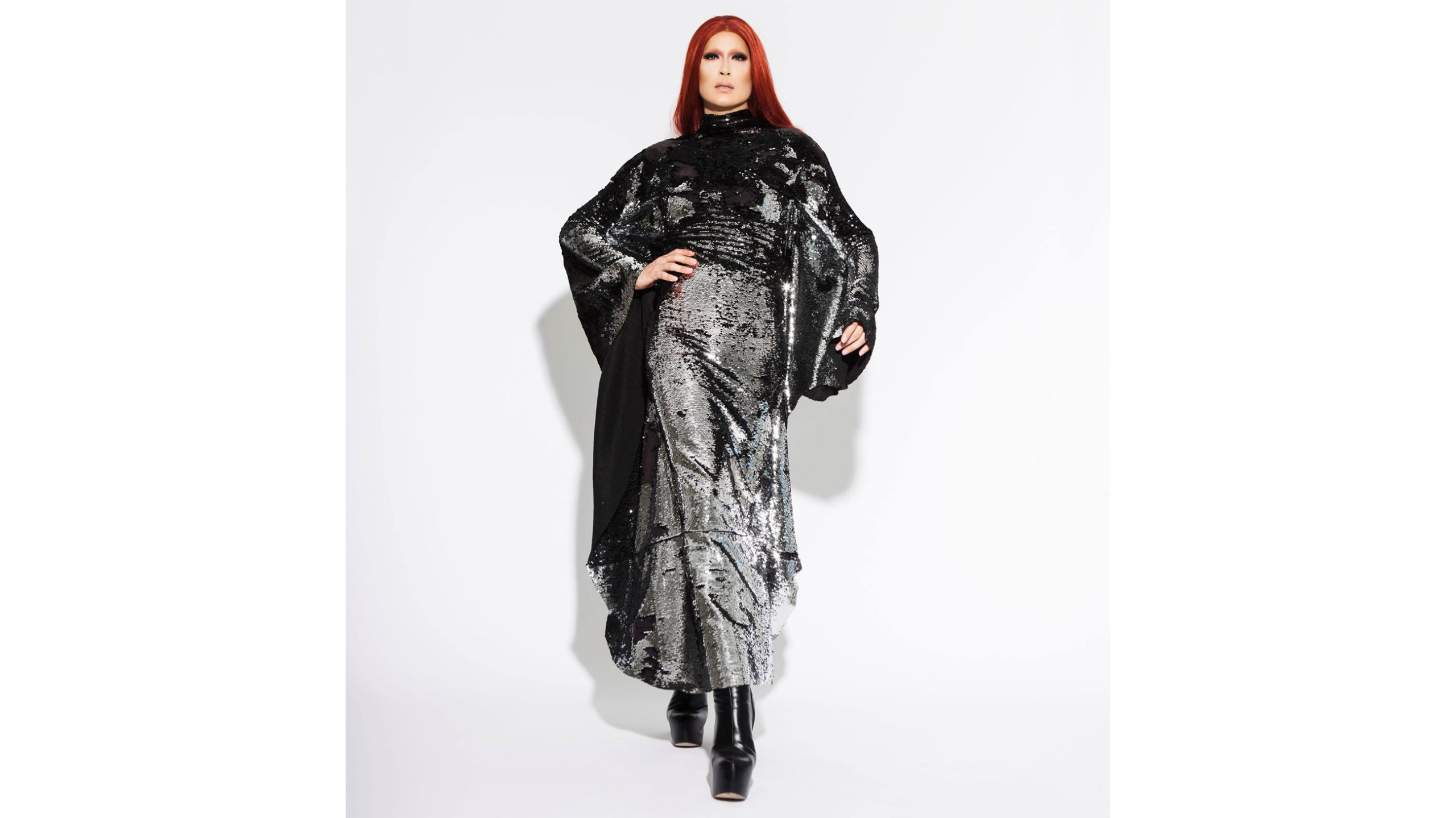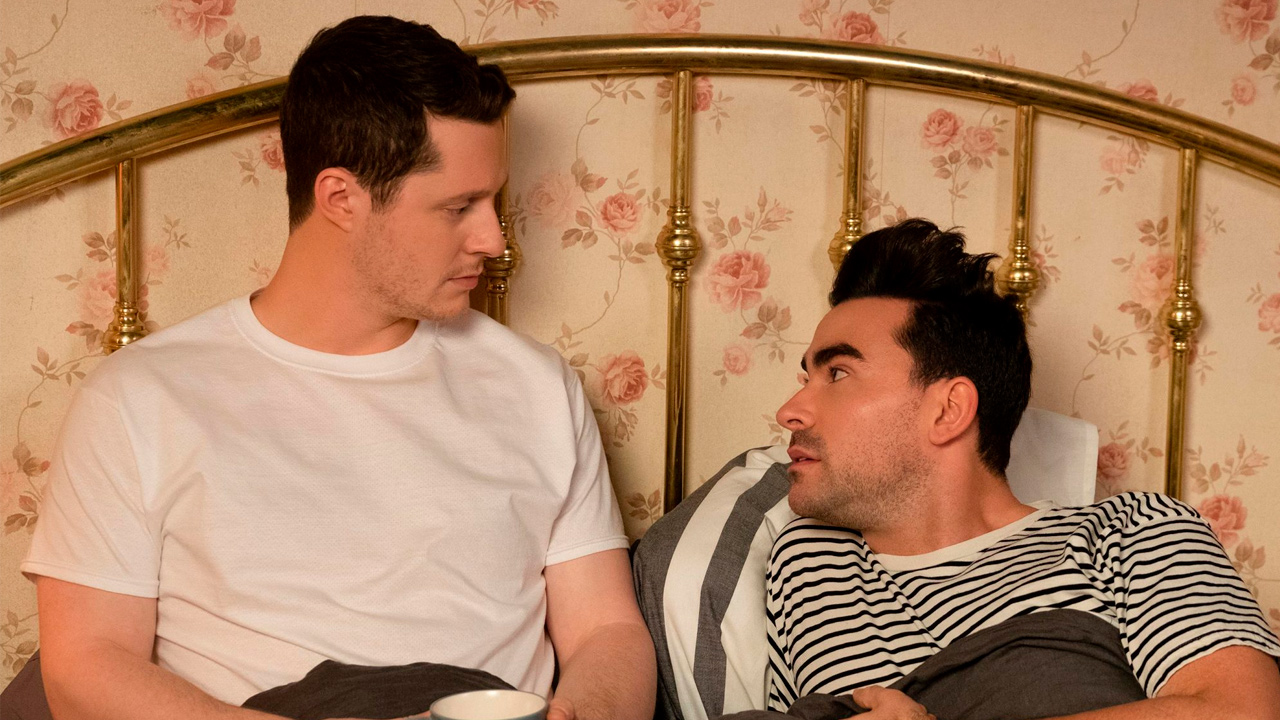Schitt’s Creek and the Joy of Being Different
11 queer Canadians on what the iconic show means to them

After six hilarious seasons, a few thousand wigs and innumerable utterances of “Ew, David!,” Schitt’s Creek finally ends its run on April 7.
The Canadian sitcom that started with a traditional fish-out-of-water premise grew into something much more profound, buoyed by witty writing, strong performances and an emotional honesty rare for the format. At a time when so many comedies are encouraged to be broadly appealing to a wide audience, the series revelled in being both specific and different, immediately differentiating itself from the pack of more forgettable TV shows and gaining an international following—and a few Emmy nominations—in the process.
Perhaps most significant in all of this has been the show’s treatment of sexuality. Dan Levy’s David Rose is noteworthy entirely because he isn’t—a queer character granted the permission to be himself without the typical burdens of representation for the sake of checking a box. And in a world where so much is the source of humour, his sexuality is never a punchline. And, of course, there’s Catherine O’Hara’s Moira Rose, a campy diva who has generated her own share of memes and drag numbers.
The show has become especially meaningful for its queer audience and, so as it draws to a close, FLARE reached out to some fans within the LGBTQ community to talk why they love the series, and specific moments that stood out to them.
Adam Barrett, producer and community arts worker
“The thing that the show does best in terms of queer representation is actually how it handles the straight characters. It creates a kind of homophobia-free, revisionist reality that hopeful queers have been living in for a while. There’s a kind of non-reaction to David’s (albeit white, male) queerness from the people in this funny little small town, and that non-reaction imagines that it’s a world of full acceptance.
“The people I know who still live in the small town where I grew up are far from the imagined trolls that [comedies tend to send up]. Small towns are full of pride picnics and weirdo queerdos and really good sweaters. And I think that’s part of what appeals: It’s a reality that is so very close to the truth in so many ways, and that maybe by existing Schitt’s Creek is bringing that reality closer.”
Alix Markman, screenwriter and script coordinator
“Coming at it as both a screenwriter and a member of the queer community, I think a lot of shows struggle with the portrayal of bisexual and pansexual characters. If they pair a queer character with someone of the opposite sex, they fear accusations of gay erasure. But pair a canonically bi or pan character with only same-sex partners, and that’s bi-/pan-erasure. So I think a lot of shows struggle with how to find that balance—and Schitt’s has done it beautifully.
“David is completely devoted to Patrick, but never once is he pressured to renounce or suppress his pansexual identity (which, unfortunately, happens in a lot of real-world relationships). In the season 6 premiere (‘Smoke Signals’), when they’re in the process of finding a venue for their upcoming wedding, David makes a reference to an ex-girlfriend. It’s a tiny moment, but as someone who identifies somewhere in between, it meant so much to me.”
Craig Francis, writer, illustrator and director
“As a queer viewer, it is of course refreshing to see a pansexual lead character in David, and discussions of sexuality happen so breezily and so positively. It’s important to recognize Dan Levy’s contribution to LGBTQ representation in his writing and performance of David, but as a Gen X gay viewer my favourite character is obviously Moira Rose.
“Gay men have traditionally liked our divas either as talented tragic creatures, or the fabulous ballsy women we aspire to have the courage of. Moira Rose picks up the torch of fabulousness from Alexis Carrington Colby Dexter Carrington in Dynasty, Patsy Stone in Absolutely Fabulous and Karen Walker in Will & Grace, as a debauched, over-the-top fashion plate who speaks her mind hilariously. The quips! The accent! The outfits! Every Moira look is a drag runway come to life, from platform shoes to wig. We may feel we are David, but we want to be Moira.”
David Spina, bartender
“Watching Schitt’s Creek as an adult…the show echoes the sentiment that I learned while growing up as a gay kid from Toronto: There is no ‘right’ way of doing things. As a member of the queer community, it became very evident to me that different people have different ways of doing things and can still end up with reaching the same goals. The issue of queerness is never portrayed as a ‘big deal’ on the show. Instead, the plot and characters, particularly David and his partner Patrick, are able to be themselves unapologetically without having to dwell on who they are. They are simply human and go through the same motions that we all do.
“Thus, the show emulates my own personal motto: It’s OK to follow your own path and do things different. My only regret is that this show wasn’t around when I was growing up, but now that it is, it will continue to teach younger queer audiences that it’s not who you love, but how you love.”
Adam Moco (aka Miss Moco), drag queen and International Wig-Snatching Diva

“What I love about the series is the characters—they are all so perfect. Specifically, what gets me is Moira’s bizarre accent and anything to come out of Alexis’s mouth. And the looks! Moira’s ever-changing wigs are pretty great, and all of her styling is fantastic! As for an important episode, ‘RIP Moira Rose’ really sticks with me because of the line—‘Fear not, she hath risen.’
“Earlier this year, I collaborated with VSP Consignment and they gifted me the white dress Catherine wears in that scene, and I was lucky enough to get to model other pieces from Moira’s wardrobe as well. The show has even inspired my drag, doing an ‘A Little Bit Alexis’ mashup number. I even got to perform for Annie Murphy at a holiday event this past December!”
Terry Blas, author and cartoonist
“I instantly loved David Rose. I, too, wear a lot of black. (I’d even wear a black leather sweater in summer like he does if it looked nice on me.) I don’t wear tight clothes, neither did he. He was a funny, pop culture spouting, queer, fashionista with a pompadour. I’m a couple of those things, but not since Ugly Betty have I felt like I saw myself on screen. It was refreshing. But my favourite thing about David is that eventually, even if it’s not easy, he does what’s right, and you know what…I love that for him.
“My favourite episode is ‘Life is a Cabaret.’ Stevie was supposed to be getting ready to go on stage in Schitt’s Creek’s community theatre production of Cabaret, and it seemed like too much for her. It’s Moira who comforts her. It is one of the only moments where Moira drops her self-imposed, crazy accent we’ve all come to love, and for a moment, she speaks plainly and from the heart. I was in a musical once, and I knew the fear of performing, of messing up, of not being good enough. That scene made me cry. Moira gave Stevie what she needed most in that moment, a mother and a friend. Someone to tell her she was important who already had strength inside of her. Sometimes that’s all we need.”
Moe Laverty, photographer
“Schitt’s Creek does gay representation well because it’s a series with a gay character but it’s not a series about a gay character. It doesn’t have to be the focus of the story, [or the typical] tragedy or coming-out story. David is a son, a brother, a business owner, who happens to be pansexual. David’s family is totally nonplussed and accepting of David’s sexuality, as is the rest of [the town]. In early episodes, Mr. Rose often mentions David being pansexual. Something rarely, if ever, heard on prime-time TV.
“My favourite episode is ‘Open Mic.’ Patrick’s coming out is only a part of an episode, not the whole episode, and it’s done with real tenderness with Patrick singing Tina Turner’s ‘You’re Simply the Best,’ which brought a tear to my eye and I’m not one who tears up often.”
Emily Bradley, office administrator
“I really love that no one even comments at all about David being queer. It’s just like this flawless acceptance, yet it doesn’t downplay the queer experience. They still manage to do this great, emotional storyline about Patrick coming out to his parents. The show also makes me cry-laugh pretty consistently. I don’t think I have a favourite episode, because about ten come to mind.
“My absolute favourite scene though is the beginning of the second episode, ‘The Drip.’ From the start to the title card, it’s ridiculously funny, and just a great picture of the four main characters, early in the series. If I am trying to recommend the show to a friend, I always show them that scene! Never had a bad reaction either.”
Jason Karman, filmmaker
“I love how Schitt’s Creek addresses genuineness and celebrates differences. In the big city, the Rose family is surrounded by so many disingenuous people that they have almost become fake. The residents of Schitt’s Creek, a small town in the middle nowhere, are the opposite. They bring them back to reality.
“Celebrating our ordinary, as well as our extraordinary moments, makes us more universally accessible. The scene in the car in ‘Grad Night’ when Patrick came out to David is one of the best. Patrick’s confession of him feeling different afterwards was an exceptional queer moment for Canadian network TV. The same-sex kiss, which was notably on screen, felt genuine and revealing rather than being implied and gimmicky.”
Bobby Valen, production manager
“This is the best ensemble cast on TV right now. The writing is so spot on and witty, and I love that this show also manages to discuss privilege and class in a way that’s a little more relaxed but still driving home its points. I mean, the Roses are in no way underprivileged but it’s a whole new world for them to adjust to. They are completely out of touch with reality but they are learning.
“My favourite episode is ‘Honeymoon.’ David and Stevie are buying wine, and while trying to pick one out, David ends up ‘coming out’—describing his character’s orientation like a bottle of rosé. I was like, ‘Did they just describe queerness?!? Holy crap, this show gets it but also it didn’t feel the need to over explain it.’ Seeing as I’m a rosé champagne kinda guy, it was a refreshing thing to see on TV.
“Also, love David’s non-binary over-the-top high fashion luxury athleisure wardrobe.”
Travis Ryans, assistant director in film/television
“I mean, the wine conversation (from ‘Honeymoon’) between David and Stevie is ICONIC, but as someone who doesn’t identify as bi or pan, it’s not something that touched me really personally. The episode that most impacted me is ‘Rock On.’ A stranger starts flirting with Patrick and leaves him his number, and David encourages him to go on a date with him. And I’ve been in David’s exact situation.
“As queer people, open relationships are a lot more common, for a lot of reasons, and it’s considered EXTREMELY taboo in media. It’s seen as slutty, irresponsible, immoral and meaning you don’t really love the person you’re with. Even though the characters decide to remain exclusive, it’s not for any moral reason. It’s just something they both want, and they leave the door open to pursue it again in the future, and they almost do in a future episode. My boyfriend and I watched that episode together and shared a knowing smile and I started to get tears in my eyes.”









